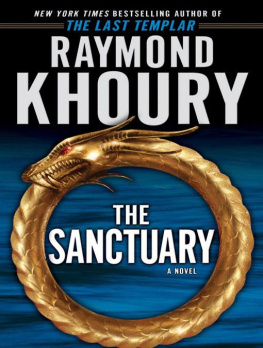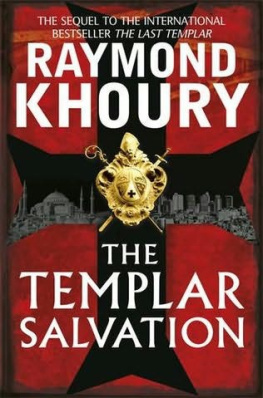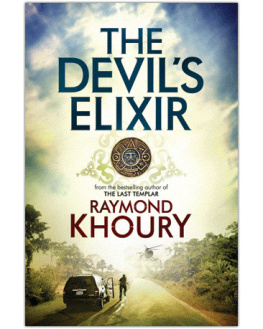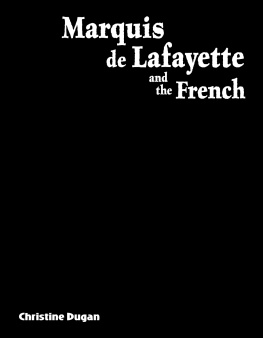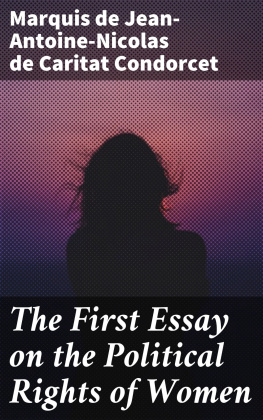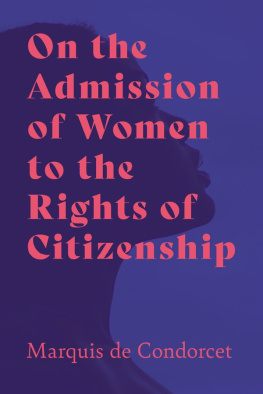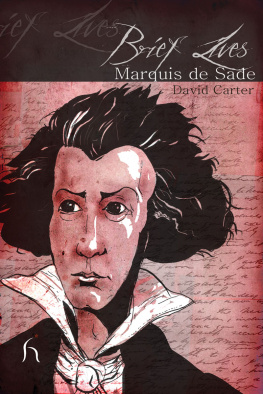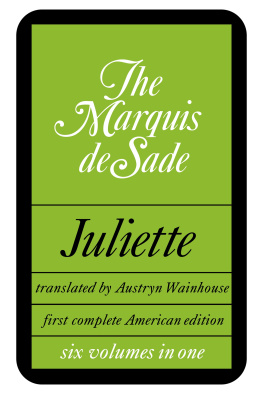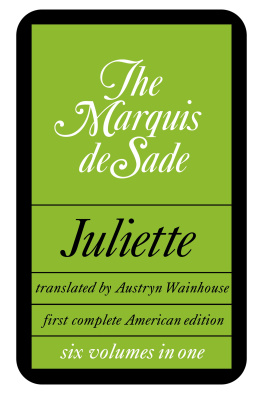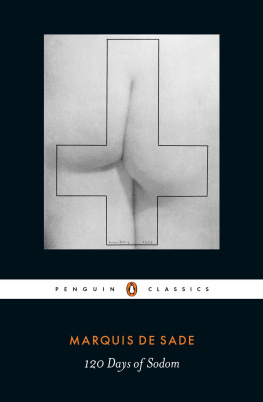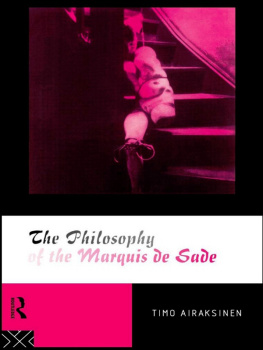THE SANCTUARY
By
RAYMOND KHOURY
Copyright 2007
For my amazing daughters ,
my very own elixirs.
No father could possibly be any prouder.
When a distinguished scientist states that something is possible, he is almost certainly right. When he states that something is impossible, he is very probably wrong.
ARTHUR C. CLARKE
Tempus edax, homo edacior. (Time devours; man devours even more.)
Ancient Roman saying
Synopsis
In the next thriller from the author of the international bestseller The Last Templar, which has more than one million copies in print in both hardcover and paperback, a geneticist becomes embroiled in a deadly quest for a secret that has destroyed everyone in its path for centuries.
Naples , 1750. In the dead of the night, three men with swords burst into the palazzo of a marquis. The intruders leader, the Prince of San Severo, accuses the marquis of being an imposter, and demands to know a secret that he believes the man harbours. In the fight that ensues, the false marquis escapes over the rooftops, leaving behind a burning palazzo and a raging prince who is now obsessed with finding his quarry at any cost.
Baghdad , 2003. An American army unit hunting down Saddams inner circle makes a horrifying discovery: a state-of-the-art, concealed lab where dozens men, women, children have died after enduring gruesome experiments. The mysterious scientist they were after, a man believed to be working on a bioweapons program and known only as the hakeem the doctor escapes, taking with him the startling truth about his work. A puzzling clue is left behind, crudely carved into the wall of one of the underground prisons cells: a circular symbol of a snake feeding on its own tail.
So begins Raymond Khourys explosive new novel, placing two bold women at the centre of the action as they get caught up in a murderous trail of ancient clues. Ripped from the history books and coupled with cutting-edge science, THE SANCTUARY delivers even more of the brilliant mystery and rapid-fire suspense that made Khourys debut novel, THE LAST TEMPLAR, a Sunday Times, New York Times and #1 international bestseller.
Prologue
I
Naples November 1749
T he scrape was hardly there, but it still woke him up. It wasnt really loud enough to rouse anyone from a deep sleep, but then, he hadnt slept well for years.
It sounded like metal, brushing against stone.
Could be nothing. An anodyne, household noise. One of the servants getting a head start on the day.
Maybe.
On the other hand, it could be something less auspicious. Like a sword. Accidentally scraping along a wall.
Someones here.
He sat up, listening intently. Everything was deathly quiet for a moment. Then he heard something else.
Footsteps.
Stealing up cold limestone stairs.
At the edge of his consciousness, but definitely there.
And getting closer.
He bolted out of bed and over to the French windows that led to a small balcony across from the fireplace. He pulled the curtain to one side, swung the door open quietly and slipped out into the biting night air. Winter was closing in quickly now, and his bare feet froze on the icy stone floor. He leaned over the balustrade and peered down. The courtyard of his palazzo was enshrouded in a stygian darkness. He concentrated his gaze, looking for a reflection, a glint of movement, but he couldnt see any sign of life below. No horses, no carts, no valets or servants. Across the street and beyond, the outlines of the other houses were barely discernible, backlit by the first glimmer of dawn that hinted from behind Vesuvius. Hed witnessed the sun rising up behind the mountain and its ominous trail of gray smoke several times. It was a majestic, inspiring sight, one that usually brought him some solace when not much else did.
Tonight was different. He could feel a prickling malignancy in the air.
He hurried back inside and slipped on his breeches and a shirt, not bothering with the buttons. There were more pressing needs. He rushed to his dressing table and pulled open its top drawer. His fingers had just managed to reach the daggers grip when the door to his bedchamber burst open and three men charged in. Their swords were already drawn. In the dim light of the dying embers in the hearth, he could also make out a pistol carried by the middle man.
The light was enough for him to recognize the man. And instantly, he knew what this was about.
Dont do anything foolish, Montferrat , the lead attacker rasped.
The man who went by the name of the Marquis de Montferrat raised his arms calmingly and carefully sidestepped away from the dressing table. The intruders fanned out to either side of him, their blades hovering menacingly in his face.
What are you doing here? he asked cautiously.
Raimondo di Sangro sheathed his sword and laid his pistol on the table. He grabbed a side chair and kicked it over to the marquis. It hit a groove in the flooring and tumbled noisily onto its side. Sit down, he barked. I suspect this is going to take a while.
His eyes fixed on di Sangro, Montferrat righted the chair and hesitantly sat down. What do you want?
Di Sangro reached into the hearth and ignited a taper, which he used to light an oil lantern. He set it on the table and retrieved his gun, then waved his men out dismissively with it. They nodded and left the room, closing the door behind them. Di Sangro pulled over another chair and sat astride it, face-to-face with his prey. You know very well what I want, Montferrat, he replied, aiming the double-barrel flintlock pistol at him menacingly as he studied him, before adding acidly, And you can start with your real name.
My real name?
Lets not play games, Marquese . He slurred the last word mockingly, his face brimming with condescension. I had your letters checked. Theyre forged. In fact, nothing in the vague snippets youve let slip about your past, since the moment you got here, seems to have any truth.
Montferrat knew that his accuser had all the resources necessary to make such inquiries. Raimondo di Sangro had inherited the title of principediSan Severo prince of San Severo at the tender age of sixteen, after the deaths of his two brothers. He counted the young Spanish king of Naples and Sicily , Charles VII, among his friends and admirers.
How could I have so misread this man? Montferrat thought with burgeoning horror. How could I have so misread this place?
After years of torment and self-doubt, he had finally abandoned his quest in the Orient and returned to Europe less than a year earlier, making his way to Naples by way of Constantinople and Venice. He hadnt intended to stay in the city. His plan had been to continue onward to Messina , and from there to sail on to Spain and, possibly, back home to Portugal .
He paused at the thought.
Home.
A word meant for others, not for him. An empty, hollow word, bone-picked clean of any resonance by the passage of time.
Naples had given pause to his thoughts of surrender. Under the Spanish viceroys, it had grown to become the second city of Europe , after Paris . It was also part of a new Europe he was discovering, a different Europe than the one he had left behind. It was a land where the ideas of the Enlightenment were steering people to a new future, ideas embraced and nurtured in Naples by Charles VII, who had championed discourse, learning, and cultural debate. The king had set up a National Library, as well as an Archaeological Museum to house the relics unearthed from the recently discovered buried towns of Herculaneum and Pompeii . Of further allure was that the king was hostile to the Inquisition, the bane of Montferrat s previous life. Wary of the Jesuits influence, the king had trod carefully in suppressing them, which he had managed to do without raising the ire of the pope.

